Key Takeaways:
- Bariatric surgery leads to type 2 diabetes remission in the majority of patients, with many experiencing improvements in blood sugar levels before significant weight loss occurs.
- Different procedures have varying effectiveness for type 2 diabetes, with gastric bypass showing the highest remission rates.
- Long-term studies suggest that bariatric surgery lowers the risk of cardiovascular events and other serious conditions in people with type 2 diabetes.
If you’re living with type 2 diabetes and struggling with excess weight, you’ve probably tried countless diets, exercise plans, and medications. The constant blood sugar monitoring, medication adjustments, and worries about long-term complications can be quite taxing. That’s why many people turn to bariatric surgery as a potential solution for both their weight and diabetes.
But is bariatric surgery for diabetes really the “ultimate fix”? We’re going to explore this question together, breaking down the science and looking at what this option might mean for you or someone you care about.
Table of Contents
Link Between Obesity and Type 2 Diabetes
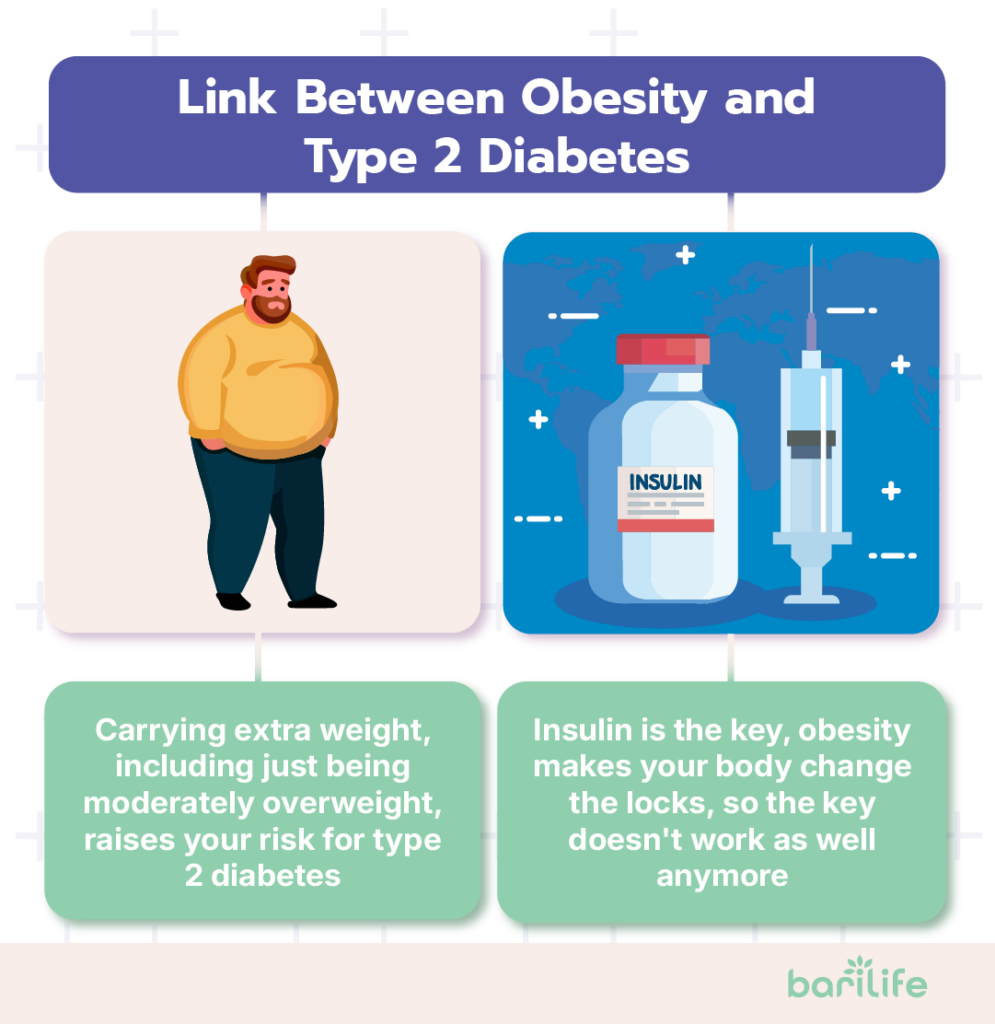
Before diving into bariatric surgery, it’s important to understand why obesity and diabetes are so closely connected.
The Weight-Diabetes Connection
Did you know that if you’re carrying extra weight, you are at a greater risk of developing type 2 diabetes? Even being moderately overweight increases your risk.
The good news is that addressing your weight can have a profoundly positive impact on your diabetes. Even losing just 10–15 pounds can make a significant difference.
Think about it this way: for many people, excess weight and diabetes are like two sides of the same coin. When you tackle one, you often improve the other. That’s why weight loss is usually one of the first things doctors recommend when you’re diagnosed with type 2 diabetes.
How Excess Weight Affects Your Insulin
Your body produces a hormone called insulin. This acts like a key that unlocks your cells, allowing sugar (glucose) to enter, where it is used for energy. But when you have excess body fat, especially around your midsection, something frustrating happens—your cells start ignoring insulin.
This is called insulin resistance. Your pancreas tries to compensate by pumping out more insulin, but eventually, it can’t keep up. Sugar builds up in your bloodstream instead of entering your cells, and type 2 diabetes develops.
So, if insulin is the key, obesity makes your body change the locks, so the key doesn’t work as well anymore. Your pancreas has to produce more and more insulin to open the same number of cells. Eventually, the key factory (your pancreas) gets exhausted and can’t produce enough working keys.
What many people don’t realize is that by the time you’re diagnosed with type 2 diabetes, this process has usually been happening in your body for years. Your pancreas has been working overtime, and your cells have been growing increasingly resistant to insulin’s effects.
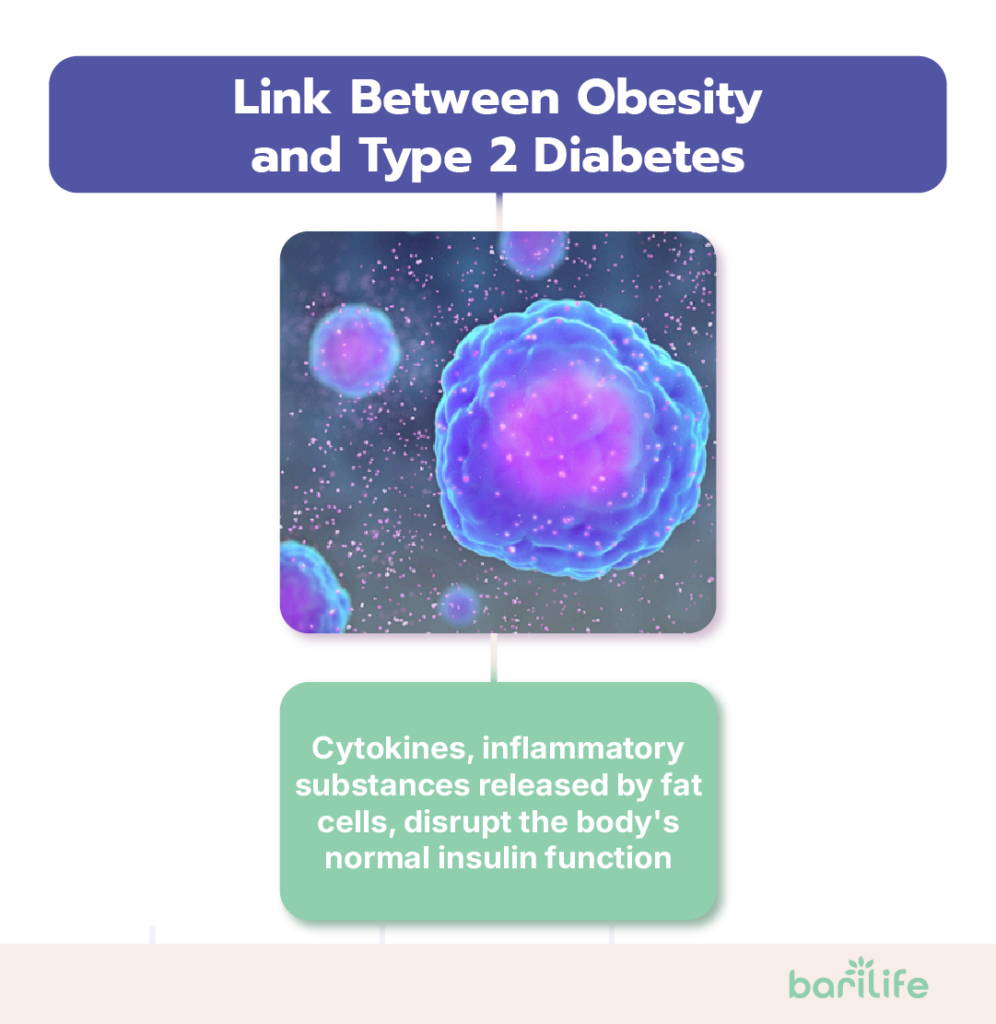
The Inflammation Factor
Another piece of the puzzle is inflammation. Excess fat tissue isn’t just sitting there—it’s actually actively releasing chemicals that cause chronic inflammation throughout your body. This inflammation disrupts your body’s insulin signaling pathways, making insulin resistance even worse.
Scientists have discovered that fat cells, particularly those located around the abdomen, release inflammatory substances known as cytokines. These cytokines interfere with the body’s normal response to insulin. So, not only is the body requiring more insulin due to insulin resistance, but inflammation is also actively disrupting the insulin that is present, preventing it from doing its job properly.
This vicious cycle is one of the reasons why diabetes can be so difficult to manage with lifestyle changes alone once it’s established. The inflammation and insulin resistance feed off each other, creating a challenging situation for your body to resolve without significant intervention.
How Bariatric Surgery Impacts Diabetes
Now, let’s discuss the remarkable impact of bariatric surgery on diabetes. For many people, the results can seem almost miraculous. Bariatric surgery for diabetes is increasingly recognized not only for its role in managing blood sugar but also for addressing other obesity-related health concerns. For example, some studies also explore bariatric surgery for hypertension, showing improvements in blood pressure alongside glycemic control.
Diabetes Improvement or Remission
One of the most exciting things about bariatric surgery and type 2 diabetes is the possibility of remission—meaning your blood sugar levels return to normal without medication. Studies show that up to 74% of patients experience diabetes remission within two years after gastric bypass surgery.
This has led many to ask, “Does bariatric surgery cure diabetes?” While the term “cure” is debated, remission is certainly achievable, especially when weight loss is sustained and healthy lifestyle changes are maintained.
Even more surprisingly, many patients notice improvements in their blood sugar levels within two weeks after surgery, before they’ve lost significant weight. This suggests that the surgery is accomplishing something beyond just aiding in weight loss.
What exactly is remission? Medical professionals typically define diabetes remission as:
- Having an A1C below 6.5%
- Not needing diabetes medications
- Maintaining these results for at least one year
Some patients achieve “complete remission,” characterized by normal blood sugar levels and no medication for 5 years or more. Others experience “partial remission,” characterized by improved blood sugar levels and a reduction in medication needs. Either way, the improvements can be life-changing.

The possibility of putting diabetes into remission is what makes bariatric surgery for type 2 diabetes such an attractive option for many people.
Better Blood Sugar Control
Even if complete remission doesn’t occur, most patients achieve much better control of their diabetes after surgery. Hemoglobin A1C levels (the test that shows your average blood sugar over three months) often drop significantly.
The effect of bariatric surgery on diabetes control typically outperforms what can be achieved with intensive medical therapy and lifestyle changes alone. Many patients who struggled for years to keep their blood sugar in check find it much easier after surgery.
Better control means more than just improved numbers on lab tests. It translates to:
- More energy and less fatigue
- Fewer instances of low or high blood sugar
- Reduced risk of diabetes complications like heart disease, kidney problems, and nerve damage
- Better overall quality of life
For someone who has been riding the blood sugar rollercoaster for years, this newfound stability can be an incredible relief.
Reduced Need for Medications
After bariatric surgery, many patients find they need fewer diabetes medications—or none at all. This reduction in medication needs usually happens quickly and continues as weight loss progresses.
Many patients report that one of the most satisfying aspects of their post-surgery experience is watching their medication list shrink. Some people who were taking insulin plus multiple oral medications find themselves medication-free within weeks or months. Even those who still need some medication usually require much lower doses.
This reduction in medication dependency can have positive ripple effects throughout your life, from fewer side effects to more flexibility in your daily routine and significant cost savings over time.
Types of Bariatric Surgery and Their Effectiveness for Diabetes
Not all weight loss surgeries are equal when it comes to improving diabetic symptoms. Here’s a breakdown of the main types and how they compare for diabetes treatment:
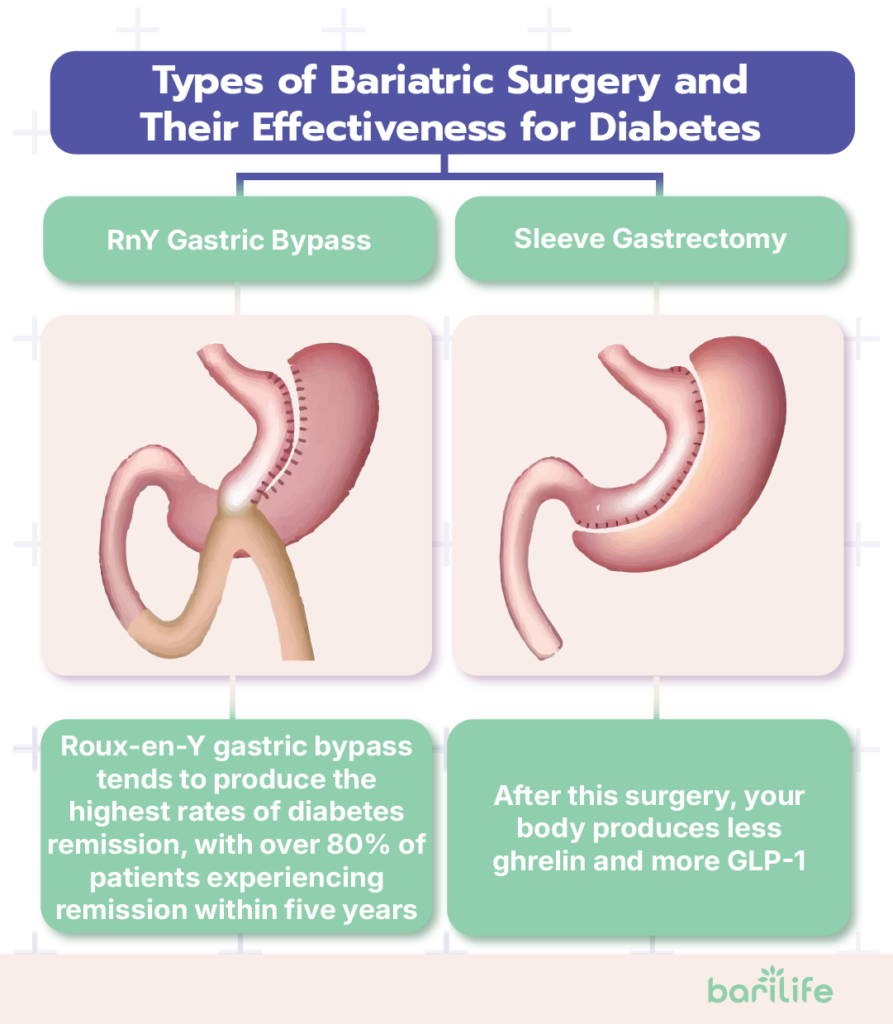
Roux-en-Y Gastric Bypass
This procedure, often considered the “gold standard” of bariatric surgery and diabetes management, works in two ways:
- The surgeon creates a small pouch at the top part of your stomach, dramatically reducing the amount of food you can eat.
- This pouch is connected directly to the mid-portion of your smaller intestine, bypassing the rest of your stomach and the first section of your small intestine.
Roux-en-Y gastric bypass tends to produce the highest rates of diabetes remission, with over 80% of patients experiencing remission within five years.
Why is gastric bypass so effective for diabetes? Scientists believe this is due to changes in gut hormones and the gut microbiome—the bacteria that reside in the digestive system. The surgery changes the way your body processes food and the signals it sends to regulate blood sugar.
Sleeve Gastrectomy
This increasingly popular procedure involves removing approximately 80% of the stomach, leaving a sleeve-shaped pouch that is significantly smaller than the original stomach. While less complex than gastric bypass, it remains highly effective in managing diabetes.
The sleeve primarily works by restricting food intake and altering gut hormones. After this surgery, your body produces less ghrelin (the “hunger hormone”) and more GLP-1 (a hormone that helps regulate blood sugar).
Due to its more straightforward technique and excellent results, sleeve gastrectomy has become the most popular type of bariatric surgery in the United States. For many patients with diabetes and obesity, it offers a good balance of effectiveness and reduced surgical complexity.
Adjustable Gastric Banding
This procedure involves putting an inflatable band around the upper part of your stomach, making a small pouch above the band. The band can be adjusted over time, making it loose or tight, by adding or removing saline through a port that’s placed under your skin.

When it comes to bariatric surgery for type 2 diabetes, gastric banding tends to be less effective than other procedures. Diabetes remission rates are about 30-45%. The improvements also tend to happen more slowly, primarily as weight loss occurs.
Unlike bypass or sleeve procedures, banding doesn’t significantly change gut hormones or metabolism independent of weight loss. This may explain why its effects on diabetes are less dramatic and more directly tied to the amount of weight lost.
Due to its lower effectiveness for diabetes remission and higher rate of long-term complications, gastric banding has declined in popularity in recent years.
Emerging Procedures
Research continues on newer procedures that may offer benefits for diabetes while being less invasive. These include:
- Duodenal-jejunal bypass liner: A flexible tube that lines the first part of your small intestine, mimicking some effects of gastric bypass without permanent changes
- Endoscopic sleeve gastroplasty: Creating a sleeve-like restriction in the stomach using sutures placed with an endoscope (no external incisions)
- Gastric balloon: A temporary balloon placed in the stomach to create feelings of fullness
While these approaches show promise, they generally don’t match the effectiveness of traditional bariatric surgeries for diabetes remission. However, they may offer options for patients who aren’t candidates for more invasive procedures or who prefer a less permanent intervention.
Long-Term Outcomes and Considerations
If you’re considering bariatric surgery for diabetes management, you may be wondering about the long-term results. Will the improvements last? What should you be prepared for down the road?
Sustained Weight Loss
One key to improving diabetes after surgery is maintaining sustained weight loss. Most patients lose about 60-80% of their excess weight 12 to 18 months post-surgery.
While some weight regain is common after the initial loss (typically about 5-10% of body weight), most patients maintain significant weight loss in the long term. This sustained weight loss helps keep diabetes under control.
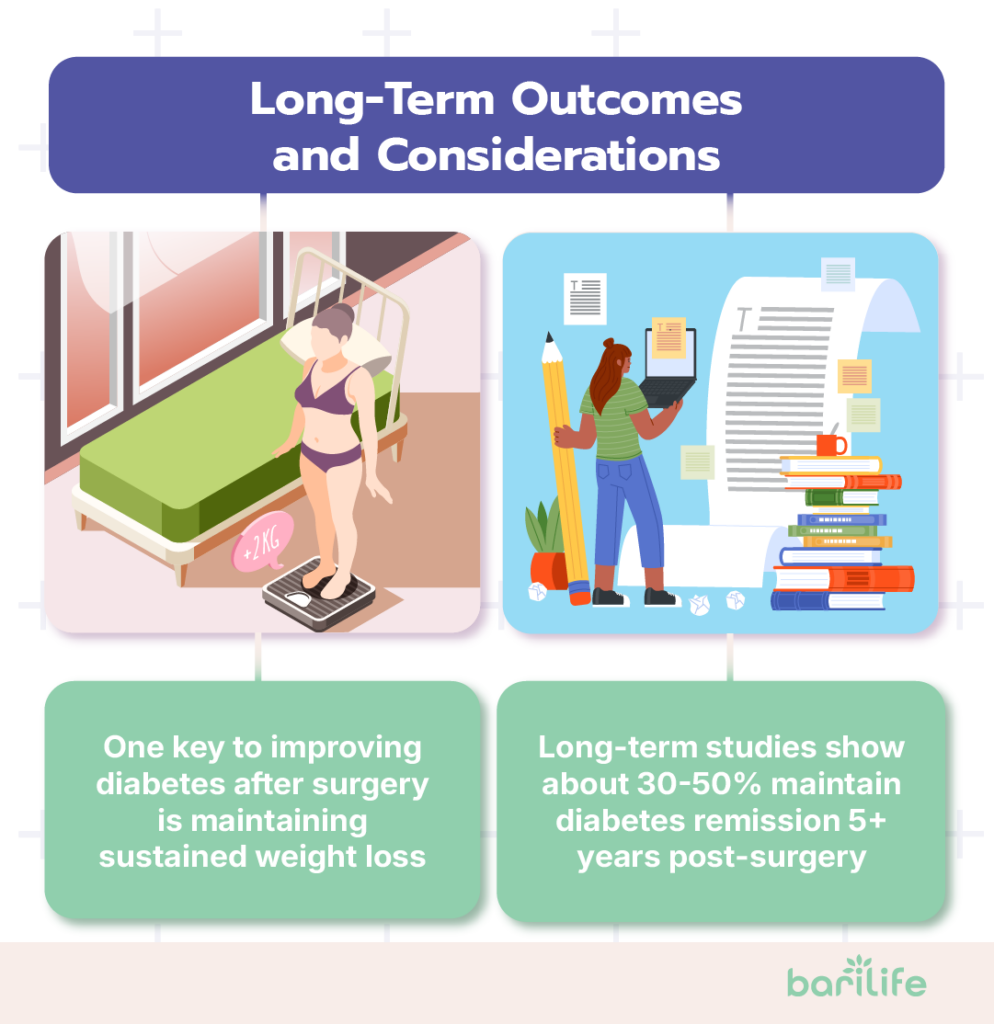
Studies following patients for 10 years or more show that most maintain enough weight loss to continue experiencing health benefits, even if they do not maintain their lowest weight. This long-term success rate is significantly higher than that achieved with non-surgical weight loss methods.
For diabetes management, even partial weight loss maintenance can make a big difference. Research suggests that losing just 5-10% of your body weight can improve insulin sensitivity, so the substantial weight loss from bariatric surgery provides powerful, lasting benefits.
Diabetes Remission: Will It Last?
The big question many patients have is whether diabetes remission after surgery is permanent. The answer is complex and individualized:
- For some patients, diabetes remains in remission indefinitely.
- For others, diabetes may return after a period of remission, especially if significant weight is regained.
- The longer you’ve had diabetes before surgery and the more severe it was, the higher the chance that it might eventually return.
Long-term studies indicate that approximately 30-50% of patients who initially achieve diabetes remission continue to maintain it for 5 years or more after surgery. Even among those whose diabetes returns, most still have better control and need fewer medications than before surgery.
The key factors that seem to predict long-lasting remission include:
- Shorter duration of diabetes before surgery (less than 8 years)
- Better preoperative blood sugar control
- Greater weight loss after surgery
- Continued healthy lifestyle practices
- Younger age at the time of surgery
Reduction in Complications and Mortality
Perhaps the most compelling argument for bariatric surgery for type 2 diabetes is its effect on long-term health outcomes and survival.
Studies show that patients who get bariatric surgery have:
- Lower risk of developing heart disease
- Lower risk of fatal heart attacks and strokes
- Reduced risk of diabetes-related kidney disease
- Reduced risk of diabetes-related eye and nerve damage
- Lower overall mortality rate compared to similar patients who don’t have surgery
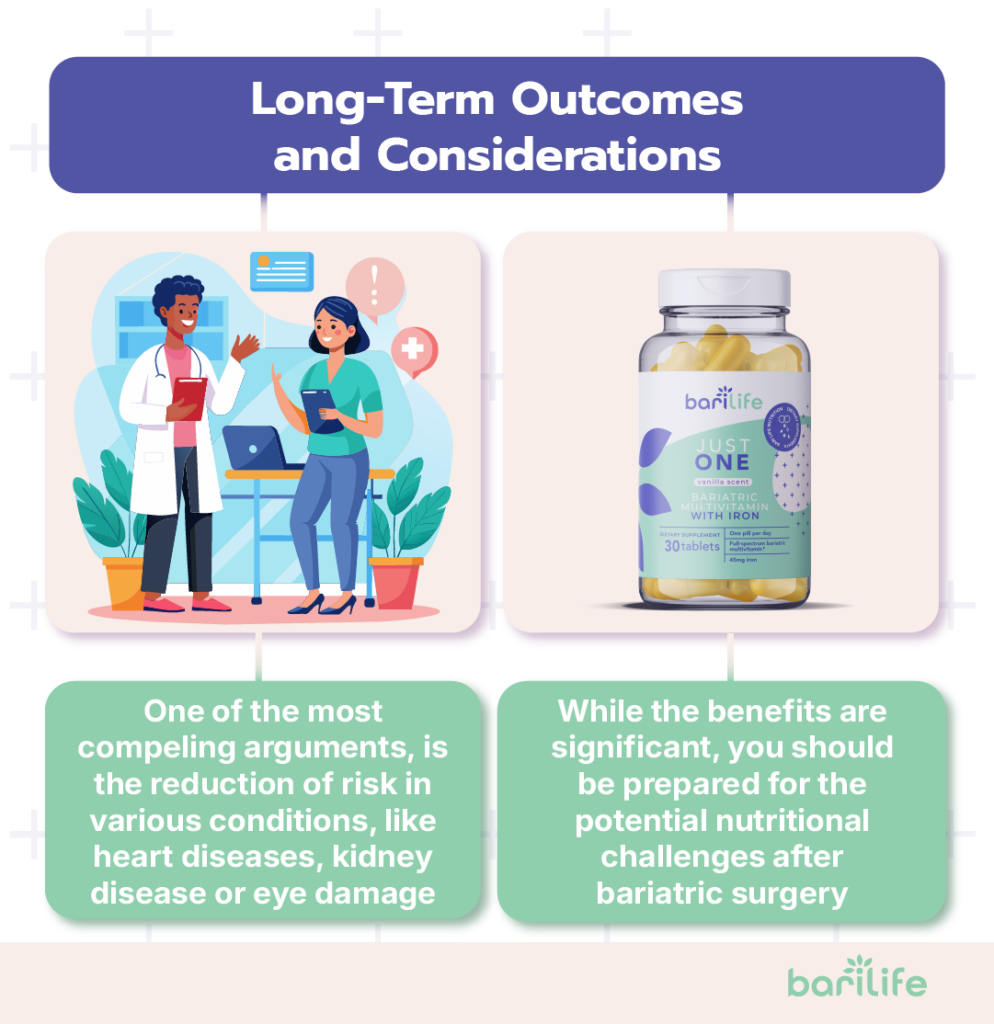
These numbers translate to real health benefits and potentially longer, healthier lives for surgery patients. For many people with severe obesity and diabetes, these improvements in long-term health outcomes are the most important reason to consider surgery.
Nutritional Considerations
While the benefits are significant, you should be prepared for the potential nutritional challenges after bariatric surgery. When you change your digestive anatomy, you also change how your body absorbs nutrients.
After surgery, you’ll need to:
- Take vitamin and mineral supplements daily, likely for life
- Get regular blood tests to see if there are deficiencies
- Pay special attention to protein intake
- Stay hydrated
- Eat small, nutrient-dense meals
Common deficiencies after surgery include vitamin B12, iron, calcium, vitamin D, and protein. These can be prevented with proper supplementation and dietary habits, but they require ongoing attention and care.
Comparing Bariatric Surgery with Other Diabetes Treatments
How does bariatric surgery stack up against other approaches to managing diabetes? Let’s compare:
Medications vs. Surgery
Traditional diabetes medications work primarily to manage blood sugar levels, not address the underlying causes of the disease. While medications can be very effective at controlling symptoms, they typically need to be continued indefinitely, often with increasing doses over time.
In contrast, bariatric surgery for diabetes can actually change the underlying physiology that causes diabetes, potentially leading to remission rather than just management.
Research comparing the two approaches shows:
- Surgery results in lower A1C levels than medication therapy alone, even with intensive medication management
- Surgery patients are more likely to reach target blood sugar levels without medications
- Surgery provides better control of related problems like high blood pressure and cholesterol
- Surgery may be more cost-effective in the long run despite higher initial costs
However, medication therapy has advantages too:
- No surgical risks
- No permanent changes to digestive anatomy

- Easier to adjust or discontinue if needed
- Accessible to more patients, including those who aren’t candidates for surgery
The best approach depends on your individual situation, including the severity of your diabetes, your general health, and your personal preferences.
Lifestyle Changes vs. Surgery
Diet, exercise, and other lifestyle modifications are always the first treatment for type 2 diabetes, and they remain important even if you choose surgery. The challenge is that significant, lasting weight loss through lifestyle alone is difficult to achieve.
Diabetes and bariatric surgery results consistently outperform lifestyle interventions alone for:
- Amount of weight lost
- Diabetes remission rates
- Improvements in cardiovascular risk factors
- Sustainability of improvements
That said, the most successful surgery patients also make significant lifestyle changes. Surgery provides a powerful tool, but your daily habits still matter tremendously for long-term success.
Comprehensive Approach
Many experts now recommend considering these options not as competing alternatives but as complementary tools in a comprehensive approach to diabetes management.
For some individuals, the ideal treatment plan might include:
- Bariatric surgery to create rapid, significant improvements
- Ongoing lifestyle modifications to support long-term success
- Medications as needed to maintain optimal control
- Regular monitoring and adjustments based on individual response
This integrated approach recognizes that diabetes is a complex, chronic condition that may require multiple strategies for optimal management.
Is Bariatric Surgery Right for You?
With all this information, you might wonder if bariatric surgery could be the right choice for diabetes management. Here are some factors to consider:
Who Is a Good Candidate?
Current guidelines generally recommend considering bariatric surgery for diabetes if:
- Your BMI is 40 or higher (regardless of diabetes control)
- Your BMI is 35-39.9, and you have type 2 diabetes that’s not well-controlled with lifestyle and medications
- Some newer guidelines suggest considering surgery for patients with a BMI of 30-34.9 who have poorly controlled diabetes despite optimal medical therapy
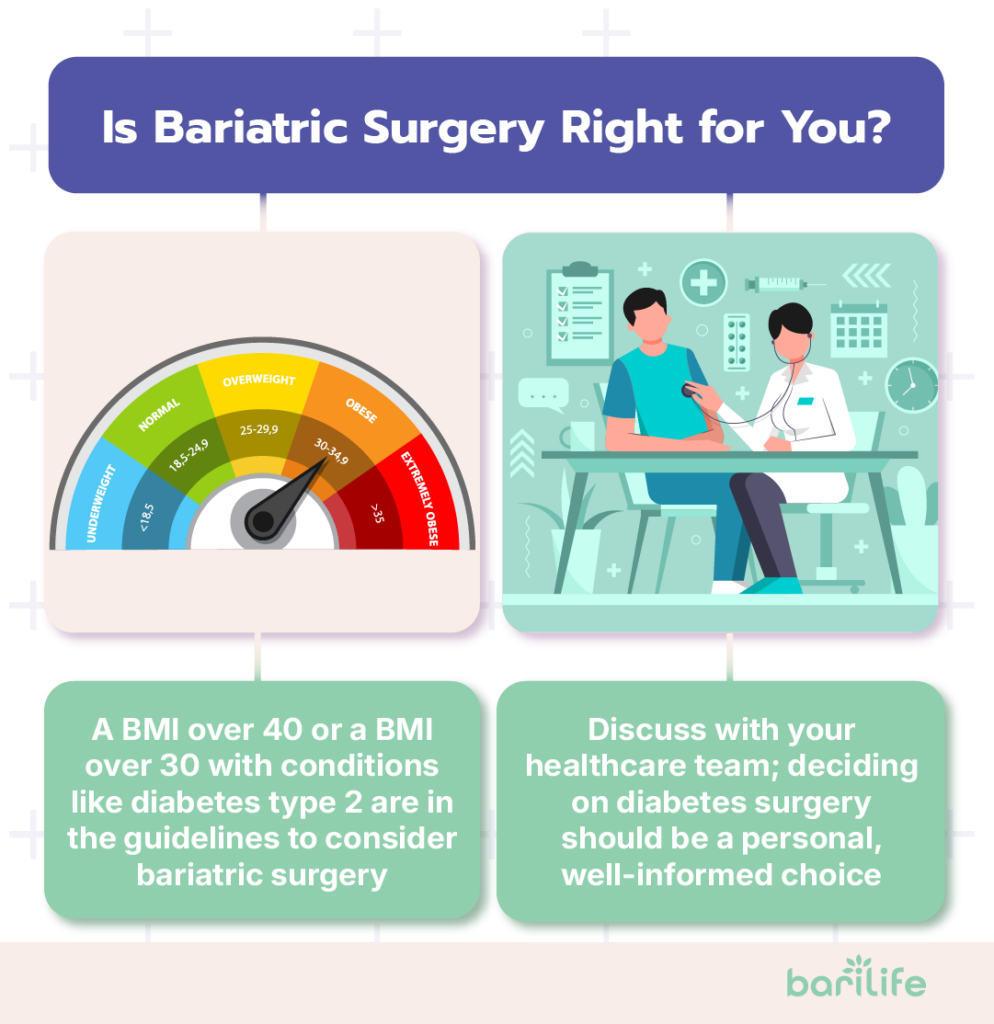
Beyond these technical criteria, good candidates also:
- Understand the lifelong changes required after surgery
- Are committed to necessary dietary and lifestyle modifications
- Have realistic expectations about outcomes
- Have support systems in place
- Don’t have conditions that would make surgery especially risky
Discussing Surgery with Your Healthcare Team
If you’re interested in the potential of bariatric surgery for your diabetes, the first step is a thorough discussion with your healthcare providers. Be prepared to ask questions like:
- Based on my specific health situation, what benefits might I expect from surgery?
- Which type of procedure would be most appropriate for me?
- What are my personal risks for complications?
- How might surgery affect my other health conditions?
- What lifestyle changes would I need to make after surgery?
This is a major life decision, and it’s important to have all your questions answered before proceeding.
Making an Informed Decision
The decision about whether to pursue bariatric surgery for diabetes should be deeply personal and based on thorough information. Consider:
- Your diabetes severity and how well it’s currently managed
- Your overall health and risk factors
- Your quality of life with your current treatment approach
- Your willingness to commit to post-surgical lifestyle changes
- Your personal feelings about surgical intervention
For many people with obesity and type 2 diabetes, bariatric surgery offers a powerful tool for improving health and quality of life. The research supporting its effectiveness is strong, and the benefits often extend far beyond weight loss.
Conclusion
While not a perfect or universal solution, the effect of bariatric surgery on diabetes represents one of the biggest developments in diabetes treatment in recent decades. For suitable candidates, it can provide a path to improved health and a reduced medication burden.
If you’re struggling with both excess weight and diabetes, it’s worth having a conversation with your healthcare team about whether bariatric surgery might be an option for you.
How Bari Life Can Help
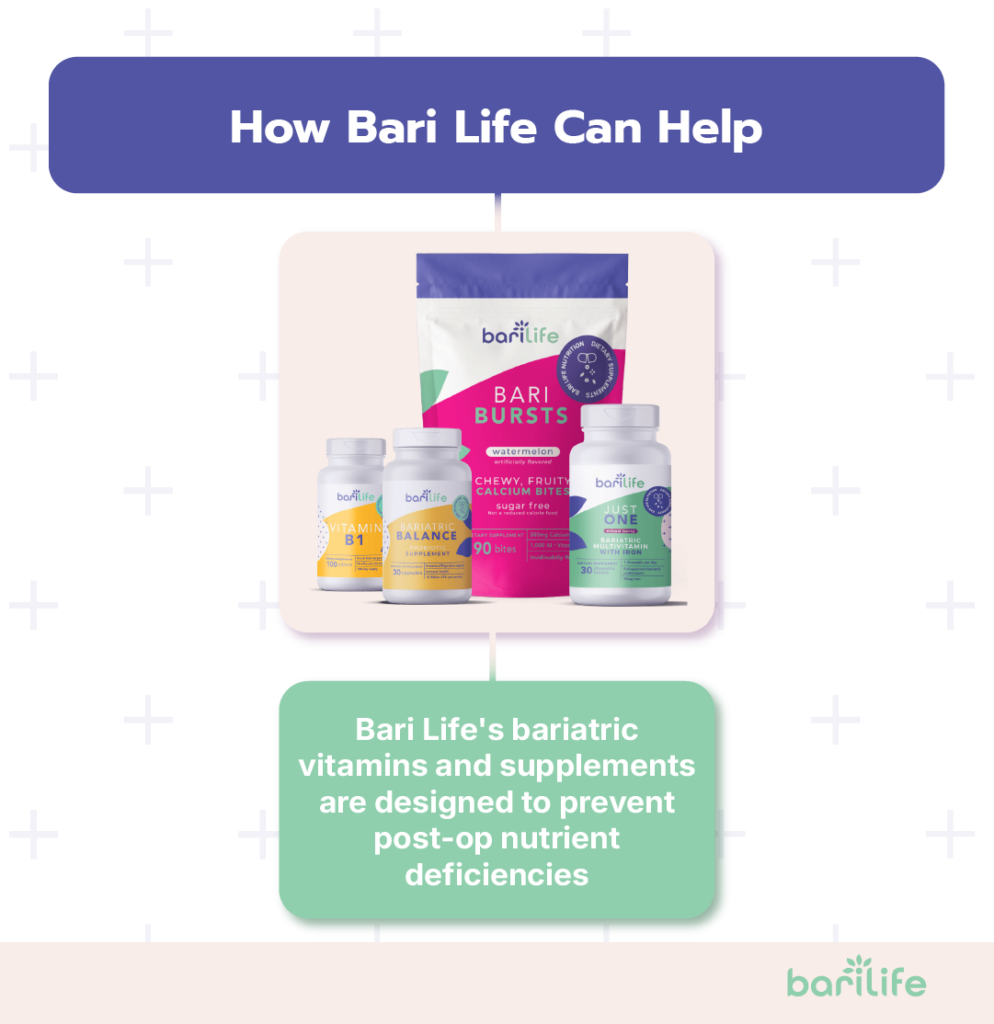
Proper nutrition is crucial for maintaining the metabolic benefits of bariatric surgery, especially for patients with diabetes. Bari Life offers a complete range of bariatric vitamins and supplements specifically designed to meet the unique needs of post-surgery patients.
Our bariatric multivitamins, including bariatric multivitamin with iron, are formulated to prevent the nutritional deficiencies that commonly occur after weight loss surgery. We also offer bariatric vitamins chewable options and liquid bariatric vitamin formats to suit different preferences and absorption needs.
To support protein intake, essential for healing and sustained energy, Bari Life provides bariatric protein shakes and bariatric protein bars—both delicious and easy to integrate into your daily routine. These are great additions to your post-op diet and help maintain muscle mass while losing weight.
Managing blood sugar levels is especially important for patients with diabetes. Our carefully balanced bariatric snacks can help avoid spikes and crashes, supporting more stable glucose levels throughout the day.
In addition, our bariatric calcium chews and bariatric probiotic products ensure that you’re covering essential nutrients for bone health and gut balance—two common areas of concern after bariatric surgery.
If you’re struggling with thinning hair post-surgery, Bari Life also offers targeted support with bariatric vitamins for hair loss, addressing common deficiencies that affect hair strength and growth.
Visit Bari Life today to discover how our complete bariatric vitamin formulations can support your journey toward diabetes improvement or remission after weight loss surgery.
If you want to learn more, why not check out these articles below:
- PCOS and Bariatric Surgery
- Best Bariatric Surgery For Hiatal Hernia
- Bariatric Surgery For Gerd
- Malabsorptive bariatric surgery
- Bariatric surgery and gallbladder
Resources
Bariatric Surgery. (2022). Cleveland Clinic.
Bariatric (Weight-Loss) Surgery To Treat Type 2 Diabetes. (2020). NIH.
Extra Weight, Extra Risk. (N.D.) American Diabetes Association.
Levy, S., et al. (2023). Metabolic and Bariatric Surgery. Merck Manual.
Surgery Provides Long-Term Blood Glucose Control, Type 2 Diabetes Remission. (2024). NIH Record.
Understanding the Health Benefits and Risks of Bariatric Surgery. (2015). NIH.



What are your tips and tricks to post-bariatric success?